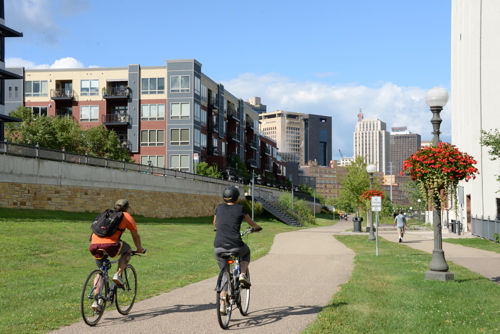Land Use
Local governments must prepare a land use plan as part of their comprehensive plan. Land use planning ensures regional investments in sewer, water, roads, parks, and other infrastructure are maximized while supporting growth, livability, and natural systems protection.
- Consistency with Regional Policy: Land use plans must meet the requirements of the Metropolitan Land Planning Act and align with adopted Council plans and policies.
- Growth and Development Patterns: Translate forecasted growth into where, when, and how much development will occur in your community.
- Balance Community Needs: Address housing, jobs, recreation, and commercial activity while creating connected, livable neighborhoods.
- Protect Natural Systems: Ensure development patterns conserve and enhance the region’s natural systems.

Minimum Requirements
Minimum requirements are the baseline elements every community must include in their comprehensive plan. They ensure consistency and compliance with state law, and alignment with regional policy. These requirements create a foundation that allows local plans to reflect community priorities while supporting regional goals. For more information about minimum requirements, click here.
Using the table
- Filter: by community, policy topic area, or explore new/updated requirements for the 2050 planning cycle.
- Ref No: Each requirement has a unique identifier. Gaps in numbering mean certain regional requirements do not apply to your community.
- Resources: provides tools, guides, and resources to help meet each requirement. Some requirements may appear more than once if multiple resources are available.
Your complete list of minimum requirements can also be downloaded directly from your Community Page.
Net Residential Density Requirements
Net density ensures orderly, efficient, and cost-effective regional growth by supporting the sustainability of services like wastewater, transit, and parks. Communities within the Metropolitan Urban Service Area (MUSA) must plan development at densities that justify these services. The Metropolitan Council sets minimum density expectations by Community Designation.
Communities must plan residential growth by decade to meet forecasted needs and minimum density requirements. Within the MUSA, growth should focus where infrastructure can efficiently serve higher-density development. Outside the MUSA, rural areas should maintain low densities to preserve farmland, natural resources, and rural character.
Community Designation |
Net Residential Density Requirements |
| Urban | 25 units per acre minimum |
| Urban Edge | 14 units per acre minimum |
| Suburban | 7 units per acre minimum |
| Suburban Edge | 3.5 units per acre minimum |
| Rural Center | 3 units per acre minimum |
| Rural Residential | 2.5 acre lots existing, 1 units per 10 acres where possible maximum |
| Diversified Rural | 4 units per 40 acres maximum |
| Agricultural | 1 unit per 40 acres maximum |
Going Beyond the Minimum Requirements
Meeting the minimum requirements ensures that a comprehensive plan is complete and compliant, but communities that go further can create plans that are truly transformative. By moving beyond the basics, local governments can reflect local priorities, prepare for future challenges, and enhance the unique character of their communities while advancing equity, resilience, and quality of life for all residents. This section offers resources, advice, and best practices to help communities strengthen their plans and set a course toward a more inclusive, sustainable, and vibrant future.
Integrate Neighborhood and Land Use Planning
- Incorporate neighborhood planning into your Future Land Use Plan. It is one way to identify specific local issues and break down goals into smaller areas.
- Include Master Plans, Transit Station Area Plans, or Design Standards in your Land Use Plan to provide clear development expectations.
- Use pictures to help visualize expected density ranges and illustrate what your density ranges (e.g. land use categories) should look like.
Plan for Agricultural Preserve Transitions
- Include the expiration date for those properties currently in the Agricultural Preserves Program and describe anticipated uses after expiration from the Program.
Monitor Mixed-Use Development
- Track and monitor the level and type of residential and commercial components in mixed-use districts, with assistance or guidelines provided by the Met Council which facilitates effective evaluation of system impacts and regional trends.
Advance Renewable Energy and Solar Planning
- The national SolSmart certification program can provide technical assistance for making your community solar-ready and can be used to demonstrate that the community has met statutory minimum standards for protecting and developing solar resources.
Advance Age-Friendly Community Planning
- Support and partner on age-friendly initiatives including Age-Friendly Minnesota’s Multisector Blueprint on Aging to create communities that meet the needs of all older adults in the region.
- Consider enrolling in the AARP Network of Age-Friendly States and Communities to become an Age-Friendly Community.
Promote Equity in Programs and Policies
- Evaluate existing and proposed programs and policies, procedures, and planned development for disproportionate impacts on marginalized and underrepresented communities as needed.
Foster Inclusive Community Building
- Encourage creative placemaking that celebrates diversity and enhances community spirit for all residents.
Support Housing Equity Initiatives
- Consider supporting and partnering with the Just Deeds Project to discharge racially restrictive covenants from housing deeds and other efforts of a similar nature.
 An official website of the
An official website of the